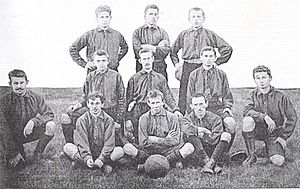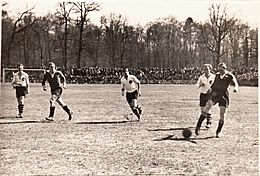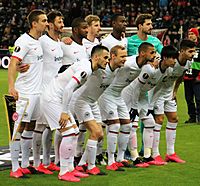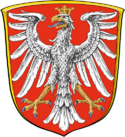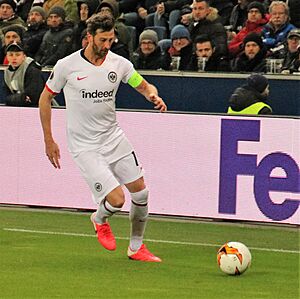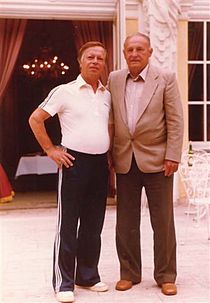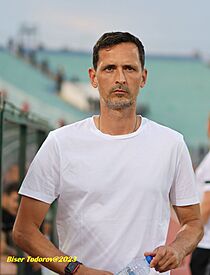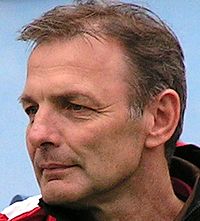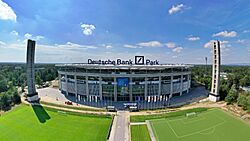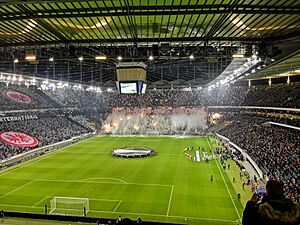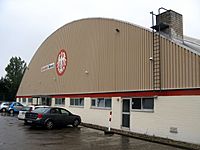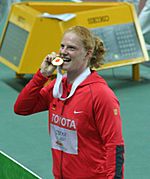Eintracht Frankfurt facts for kids
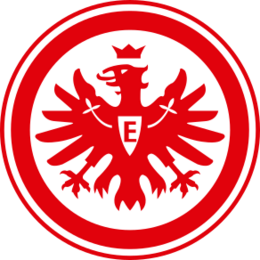 |
||||
| Full name | Eintracht Frankfurt e. V. | |||
|---|---|---|---|---|
| Nickname(s) |
|
|||
| Founded | 8 March 1899 | |||
| Ground | Deutsche Bank Park | |||
| Capacity | c. 58,000 | |||
| President | Mathias Beck | |||
| Head coach | Dino Toppmöller | |||
| League | Bundesliga | |||
| 2020–21 | Bundesliga, 5th of 18 | |||
|
||||
Eintracht Frankfurt e.V. is a famous German sports club from Frankfurt. It is best known for its football team, which started on March 8, 1899. The team plays in the Bundesliga, which is the top football league in Germany.
Eintracht has won the German championship once and the DFB-Pokal (German Cup) five times. They also won the UEFA Europa League twice. They were even runners-up in the European Cup once. Eintracht was one of the first teams in the Bundesliga when it began in 1963. They have played 56 seasons in the top league, making them one of the most experienced clubs there.
The club has 155,000 members, making it the third largest club of its kind in Germany. Since 1925, their home stadium has been the Waldstadion. Today, it is called Deutsche Bank Park for sponsorship reasons.
Eintracht Frankfurt usually wins or draws more than three-quarters of their games. They often finish in the top half of the league table. The team has one of the highest attendance rates in the world. Since 2013, about 47,942 fans attend their games on average. Charly Körbel played his whole career for Eintracht Frankfurt. He holds the record for the most appearances (602) in the Bundesliga. The club's main rival is Kickers Offenbach. However, they have not played many league matches recently because they were in different divisions.
Eintracht Frankfurt is also the world's largest multi-sports club with a professional football team. In 2024, it had almost 14,000 athletes in over 50 different sports.
Contents
Club History and Achievements
How the Club Started
Eintracht Frankfurt began with two football clubs founded in 1899. These were Frankfurter Fußball-Club Victoria von 1899 and Frankfurter Fußball-Club Kickers von 1899. In May 1911, these two teams joined together to form Frankfurter Fußball Verein (Kickers-Victoria). This new team quickly became successful. They won three league titles between 1912 and 1914.
In 1920, Frankfurter FV merged with a gymnastics club called Frankfurter Turngemeinde von 1861. They formed TuS Eintracht Frankfurt von 1861. The German word Eintracht means 'harmony' or 'concord'. So, 'Eintracht' is like 'United' in English team names.
In 1927, the gymnastics and football parts of the club separated again. They became Turngemeinde Eintracht Frankfurt von 1861 and Sportgemeinde Eintracht Frankfurt (FFV) von 1899.
Through the late 1920s and 1930s, Eintracht won several local championships. In 1932, they reached the German championship final but lost 2–0 to Bayern Munich. In 1933, German football was reorganized. Eintracht played in the top division, the Gauliga Südwest, and won their division in 1938.
After World War II, Eintracht continued to play in the top division, the Oberliga Süd. They won the first Hessenpokal in 1946. In 1953, they won the Oberliga Süd title.
National Champions and European Cup Finalists
In the 1958–59 season, Eintracht won their league again. They then qualified for the 1959 German championship. Eintracht won all six of their group games. In the final, they played against their rivals Kickers Offenbach. Frankfurt won the final 5–3 after extra time. This was their first and only German championship win.
As champions, Frankfurt played in the 1959–60 European Cup. They became famous internationally. They beat BSC Young Boys and Wiener Sport-Club to reach the semi-finals. There, they faced Scottish champions Rangers. Eintracht won the first game 6–1 at home. They scored six more goals in the second game, winning 12–4 overall.
Eintracht then played in the final in Glasgow. They lost 7–3 to Real Madrid. This final is still remembered as one of the best football matches ever.
Joining the Bundesliga
Eintracht was one of the first 16 teams chosen for the Bundesliga. This was Germany's new professional football league, started in 1963. Eintracht played in the Bundesliga for 33 years in a row. They usually finished in the top half of the table. In the first Bundesliga season, Eintracht finished 3rd. This is still their best Bundesliga finish.
Eintracht also played in other European competitions. They won the 1967 Intertoto Cup. They also reached the semi-final of the Inter-Cities Fairs Cup.
Winning Cups in the 1970s and 80s
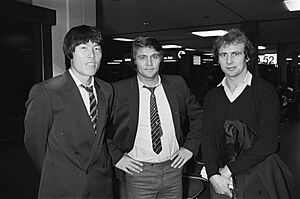
From 1973 to 1981, Eintracht had a very successful time. They won three DFB-Pokals and the UEFA Cup. Many famous players like Bernd Nickel, Charly Körbel, Bernd Hölzenbein, Jürgen Grabowski, and Cha Bum-kun played for the club during this period.
Their first big win was the 1973–74 DFB-Pokal. They won 3–1 against Hamburger SV in the final. Eintracht won the cup again in 1975, beating MSV Duisburg 1–0.
In 1979, Friedel Rausch became the head coach. Cha Bum-kun also joined the club, becoming the first Korean player in Europe. He quickly became a fan favorite. Eintracht reached the semi-finals of the 1979–80 UEFA Cup. They beat Bayern Munich 5–1 in extra time to reach the final.
In the final, Eintracht played against Borussia Mönchengladbach. They lost the first game 3–2. In the second game, teenager Fred Schaub scored the only goal, winning Eintracht the title on away goals.
In 1981, Eintracht won their third DFB-Pokal. This marked the end of their "golden period."
Later Years and Relegation Battles
In the mid-1980s, Eintracht struggled in the Bundesliga. They often finished near the bottom of the table. In 1988, they won the 1987–88 DFB-Pokal by beating VfL Bochum 1–0. The goal was scored by Lajos Détári.
In the early 1990s, Eintracht had a strong team with players like Uwe Bein, Uli Stein, Tony Yeboah, and Andreas Möller. They came very close to winning the Bundesliga title in 1991–92. They were at the top of the table before the last game but lost, and VfB Stuttgart became champions instead.
In 1995–96, Eintracht was relegated from the Bundesliga after 33 years. They returned to the Bundesliga in 1997–98. In 1998–99, they dramatically avoided relegation on the last day of the season. They were relegated again in 2001.
Eintracht returned to the Bundesliga in 2002–03 and again in 2004–05. In 2005–06, they reached the DFB-Pokal final but lost to Bayern Munich. This still allowed them to play in the UEFA Cup.
In 2010–11, the club was relegated for the fourth time. However, they quickly returned to the Bundesliga in 2011–12. In 2012–13, they finished 6th, which qualified them for the UEFA Europa League.
DFB Pokal and Europa League Success
In 2015–16, Eintracht avoided relegation through a playoff. In 2017, they reached the DFB-Pokal final but lost.
However, in 2017–18, Eintracht won their fifth DFB-Pokal. They beat strong favorites Bayern Munich 3–1 in the final.
In 2018–19, Eintracht's attacking players Luka Jović, Ante Rebić, and Sébastien Haller were called "the Buffalo Herd" for their great performances. Eintracht won all six of their group games in the Europa League. They beat tough teams like Inter Milan and S.L. Benfica. In the semi-finals, they drew both games against Chelsea but lost on penalties.
In the 2021–22 Europa League, Eintracht topped their group. They surprised Barcelona in the quarter-finals, winning 3–2 at Camp Nou with many Frankfurt fans there. They then beat West Ham in the semi-finals to reach their first European final since 1980.
In the final in Seville, Frankfurt beat Rangers 5–4 on penalties after a 1–1 draw. Rafael Santos Borré scored Eintracht's goal and the winning penalty. Goalkeeper Kevin Trapp was named man of the match. Eintracht won the competition without losing a single game. This win also qualified them for the 2022–23 UEFA Champions League, their first time in that competition since 1960.
In the Champions League, Eintracht finished second in their group and reached the knockout stages. They lost in the round of 16. In the 2022–23 DFB-Pokal, they reached the final but lost 2–0 to RB Leipzig. They finished 7th in the 2022–23 season, which qualified them for the UEFA Europa Conference League.
As of November 2024, the club's leaders include Axel Hellmann (CEO), Markus Krösche (head of sports), Julien Zamberk (head of finances), and Philipp Reschke (head of fan relations, merchandising, and HR).
Club Colors, Crest, and Nicknames
The club's crest comes from the coat of arms of the city of Frankfurt. This coat of arms shows a one-headed Imperial Eagle from the 13th century.
The crest has changed little over the years. In 1980, a new eagle design was used. But in 1999, for the club's 100th birthday, they went back to a more traditional eagle crest. Since 2005, Eintracht has had a real golden eagle mascot named Attila. Attila comes from the nearby Hanau Zoo and has been at over 200 games.
|
|
| Centennial kit in 1999–2000 |
Eintracht's official colors are red, black, and white. These colors come from the original clubs, Frankfurter FC Viktoria (red and white) and Frankfurter FC Kickers (black and white). Red and white are also the colors of Frankfurt's city coat of arms. Black and white are the colors of Prussia. When the clubs merged, they decided to use all these colors. Because local rival Kickers Offenbach also uses red and white, Eintracht often plays in black and red, or black and white. For the 2023–2024 season, their home kit is black and red.
In the 2021–22 UEFA Europa League, Eintracht often wore an all-white kit. This led to them being called la bestia blanca (meaning 'the white beast' in Spanish). This nickname came after they beat FC Barcelona at Camp Nou.
The club's main nickname is "Die Adler" ("The Eagles"), which comes from their eagle logo. Another popular nickname is SGE, from the club's old name Sportgemeinde Eintracht. This means "Sports Community Harmony."
The nickname Launische Diva ("Moody Diva") was used in the early 1990s. This was because the club would sometimes beat top teams easily but then surprisingly lose to weaker ones.
The nickname Schlappekicker ("Slipper Kickers") has been around since the 1920s. This is because a local slipper maker, J. & C. A. Schneider, helped fund the club.
Club Honors
National Titles
- German Championship / Bundesliga
- Champions (1): 1959
- Runners-up (1): 1932
- 2. Bundesliga
- Winners (1): 1997–98
- Runners-up (1): 2011–12
- DFB-Pokal
- Winners (5): 1973–74, 1974–75, 1980–81, 1987–88, 2017–18
- Runners-up (4): 1963–64, 2005–06, 2016–17, 2022–23
- DFB / DFL-Supercup
- Runners-up (2): 1988, 2018
European Titles
- European Cup / UEFA Champions League
- Runners-up (1): 1959–60
- UEFA Cup / UEFA Europa League
- Winners (2): 1979–80, 2021–22
- International Football Cup (Intertoto Cup)
- Winners (1): 1966-67
- UEFA Super Cup
- Runners-up (1): 2022
Other Competitions
- Cup of the Alps
- Winners: 1967
- Fuji-Cup
- Winners: 1992
- Runners-up: 1994
- Trofeo Bortolotti
- Winners: 2016, 2022
Regional Titles
- Southern German Championship
- Champions: 1929–30, 1931–32
- Oberliga Süd
- Champions: 1952–53, 1958–59
- Nordkreis-Liga
- Champions: 1911–12+, 1912–13+, 1913–14+
- Kreisliga Nordmain
- Champions: 1919–20+, 1920–21
- Bezirksliga Main-Hessen:
- Champions: 1927–28, 1928–29, 1929–30, 1930–31, 1931–32
- Gauliga Südwest/Mainhessen:
- Champions: 1937–38
- Hesse Cup (Tiers 3–7):
- Winners: 1946, 1969*
- Hesse Championship (Tier 3, 4 & 5):
- Champions: 1970*, 2002*, 2023*
- + As Frankfurter FV
- * Achieved by Reserve Team
League Performance Over Time
Recent Seasons

All-Time League Performance

Green means the highest level of football in Germany; yellow means the second highest.
European Club Ranking
Eintracht Frankfurt is ranked among the top football clubs in Europe. Here's their ranking as of July 2025:
| Rank | Nation | Team | Points |
|---|---|---|---|
| 26 | SSC Napoli | 61.000 | |
| 27 | PSV | 60.000 | |
| 28 | Eintracht Frankfurt | 60.000 | |
| 29 | SS Lazio | 59.000 | |
| 30 | Rangers | 59.000 |
Current Players and Staff
Current Squad
|
|
Players on Loan
|
Kit History and Sponsors
- Current Sport Brand: Adidas
- Home Kit: Black shirt with vertical red stripes, black shorts and black socks
- Away Kit: TBA
- 3rd Kit: TBA
|
Historic
|
Current
|
| Season | Kit manufacturer | Shirt sponsor | Sleeve sponsor |
|---|---|---|---|
| 1974–75 | Adidas | Remington | None |
| 1975–76 | Adidas / Admiral | ||
| 1976–77 | Admiral / Adidas | None | |
| 1977–78 | Samson | ||
| 1978–79 | Adidas / Erima | Minolta | |
| 1979–80 | |||
| 1980–81 | |||
| 1981–82 | Infotec | ||
| 1982–83 | Adidas | ||
| 1983–84 | |||
| 1984–85 | Portas | ||
| 1985–86 | |||
| 1986–87 | Hoechst | ||
| 1987–88 | Puma | ||
| 1988–89 | |||
| 1989–90 | |||
| 1990–91 | |||
| 1991–92 | Samsung | ||
| 1992–93 | |||
| 1993–94 | Tetra Pak | ||
| 1994–95 | |||
| 1995–96 | |||
| 1996–97 | Mitsubishi Motors | ||
| 1997–98 | |||
| 1998–99 | VIAG Interkom | ||
| 1999–00 | |||
| 2000–01 | Puma / Fila | Genion | |
| 2001–02 | Fila | Fraport | |
| 2002–03 | |||
| 2003–04 | Jako | ||
| 2004–05 | |||
| 2005–06 | |||
| 2006–07 | |||
| 2007–08 | |||
| 2008–09 | |||
| 2009–10 | |||
| 2010–11 | |||
| 2011–12 | |||
| 2012–13 | Krombacher | ||
| 2013–14 | Alfa Romeo | ||
| 2014–15 | Nike | ||
| 2015–16 | |||
| 2016–17 | Krombacher | ||
| 2017–18 | Indeed.com | Deutsche Börse Group | |
| 2018–19 | |||
| 2019–20 | |||
| 2020–21 | dpd | ||
| 2021–22 | |||
| 2022–23 | dpd / JOKA (in UEFA matches) |
||
| 2023–24 | Elotrans reload | ||
| 2024–25 | |||
| 2025–26 | Adidas | DVAG |
Club Staff
Club Presidents
 Wilhelm Schöndube (1920–1926)
Wilhelm Schöndube (1920–1926) Fritz Steffan /
Fritz Steffan /  Heinrich Berger (1926–1927)
Heinrich Berger (1926–1927) Horst Rebenschütz (1927)
Horst Rebenschütz (1927) Egon Graf von Beroldingen (1927–1933)
Egon Graf von Beroldingen (1927–1933) Hans Söhngen (1933–1939)
Hans Söhngen (1933–1939) Rudolf Gramlich /
Rudolf Gramlich /  Adolf Metzner (1939–1942)
Adolf Metzner (1939–1942) Anton Gentil (1942–1945) (temporary)
Anton Gentil (1942–1945) (temporary) Christian Kiefer (1945–1946) (temporary)
Christian Kiefer (1945–1946) (temporary) Günther Reis (1946)
Günther Reis (1946) Robert Brubacher (1946–1949)
Robert Brubacher (1946–1949) Anton Keller (1949–1955)
Anton Keller (1949–1955) Rudolf Gramlich (1955–1969)
Rudolf Gramlich (1955–1969) Albert Zellekens (1970–1973)
Albert Zellekens (1970–1973) Achaz von Thümen (1973–1981)
Achaz von Thümen (1973–1981) Axel Schander (1981–1983)
Axel Schander (1981–1983) Klaus Gramlich (1983–1988)
Klaus Gramlich (1983–1988) Joseph Wolf (1988)
Joseph Wolf (1988) Matthias Ohms (1988–1996)
Matthias Ohms (1988–1996) Dieter Lindner (1996) (temporary)
Dieter Lindner (1996) (temporary) Hans-Joachim Otto (1996)
Hans-Joachim Otto (1996) Rolf Heller (1996–2000)
Rolf Heller (1996–2000) Peter Fischer (2000–2024)
Peter Fischer (2000–2024) Mathias Beck (2024–)
Mathias Beck (2024–)
Coaches Through the Years
 Albert Sohn (1919)
Albert Sohn (1919) Dori Kürschner (1921–1922)
Dori Kürschner (1921–1922) Maurice Parry (1925–1926)
Maurice Parry (1925–1926) Fritz Égly /
Fritz Égly /  Walter Dietrich (1926–1927)
Walter Dietrich (1926–1927) Gustav Wieser (October 1927 – May 1928)
Gustav Wieser (October 1927 – May 1928) Paul Oßwald (1928 – August 1933)
Paul Oßwald (1928 – August 1933) Willi Spreng (1933–1935)
Willi Spreng (1933–1935) Paul Oßwald (1935–1938)
Paul Oßwald (1935–1938) Otto Boer (1939) (caretaker)
Otto Boer (1939) (caretaker) Péter Szabó (1939)
Péter Szabó (1939) Willi Lindner (1941) (caretaker)
Willi Lindner (1941) (caretaker) Péter Szabó (1942) (caretaker)
Péter Szabó (1942) (caretaker) Willi Balles (1942) (caretaker)
Willi Balles (1942) (caretaker) Willy Pfeiffer (1945) (caretaker)
Willy Pfeiffer (1945) (caretaker) Sepp Herberger (1945) (caretaker)
Sepp Herberger (1945) (caretaker) Emil Melcher (1946)
Emil Melcher (1946) Willi Treml (1947)
Willi Treml (1947) Bernhard Kellerhoff (1948 – December 1948)
Bernhard Kellerhoff (1948 – December 1948) Walter Hollstein (January 1949 – Summer 1950)
Walter Hollstein (January 1949 – Summer 1950) Kurt Windmann (Summer 1950 – July 1956)
Kurt Windmann (Summer 1950 – July 1956) Adolf Patek (July 1956 – April 1958)
Adolf Patek (July 1956 – April 1958) Paul Oßwald (April 1958 – April 1964)
Paul Oßwald (April 1958 – April 1964) Ivica Horvat (April 1964 – June 1965)
Ivica Horvat (April 1964 – June 1965) Elek Schwartz (July 1965 – June 1968)
Elek Schwartz (July 1965 – June 1968) Erich Ribbeck (July 1968 – June 1973)
Erich Ribbeck (July 1968 – June 1973) Dietrich Weise (July 1973 – June 1976)
Dietrich Weise (July 1973 – June 1976) Hans-Dieter Roos (July 1976 – November 1976)
Hans-Dieter Roos (July 1976 – November 1976) Gyula Lóránt (November 1976 – November 1977)
Gyula Lóránt (November 1976 – November 1977) Jürgen Grabowski (December 1977) (caretaker)
Jürgen Grabowski (December 1977) (caretaker) Dettmar Cramer (December 1977 – June 1978)
Dettmar Cramer (December 1977 – June 1978) Otto Knefler (July 1978 – December 1978)
Otto Knefler (July 1978 – December 1978) Udo Klug (December 1978 – January 1979) (caretaker)
Udo Klug (December 1978 – January 1979) (caretaker) Friedel Rausch (January 1979 – June 1980)
Friedel Rausch (January 1979 – June 1980) Lothar Buchmann (July 1980 – June 1982)
Lothar Buchmann (July 1980 – June 1982) Helmut Senekowitsch (July 1982 – September 1982)
Helmut Senekowitsch (July 1982 – September 1982) Branko Zebec (September 1982 – October 1983)
Branko Zebec (September 1982 – October 1983) Jürgen Grabowski (October 1983) (caretaker)
Jürgen Grabowski (October 1983) (caretaker) Klaus Mank (October 1983) (caretaker)
Klaus Mank (October 1983) (caretaker) Dietrich Weise (October 1983 – December 1986)
Dietrich Weise (October 1983 – December 1986) Timo Zahnleiter (December 1986 – June 1987)
Timo Zahnleiter (December 1986 – June 1987) Karl-Heinz Feldkamp (July 1987 – September 1988)
Karl-Heinz Feldkamp (July 1987 – September 1988) Pál Csernai (September 1988 – December 1988)
Pál Csernai (September 1988 – December 1988) Jörg Berger (December 1988 – April 1991)
Jörg Berger (December 1988 – April 1991) Dragoslav Stepanović (April 1991 – March 1993)
Dragoslav Stepanović (April 1991 – March 1993) Horst Heese (March 1993 – June 1993)
Horst Heese (March 1993 – June 1993) Klaus Toppmöller (July 1993 – April 1994)
Klaus Toppmöller (July 1993 – April 1994) Charly Körbel (April 1994 – June 1994) (caretaker)
Charly Körbel (April 1994 – June 1994) (caretaker) Jupp Heynckes (July 1994 – April 1995)
Jupp Heynckes (July 1994 – April 1995) Charly Körbel (April 1995 – March 1996)
Charly Körbel (April 1995 – March 1996) Dragoslav Stepanović (April 1996 – December 1996)
Dragoslav Stepanović (April 1996 – December 1996) Rudolf Bommer (December 1996) (caretaker)
Rudolf Bommer (December 1996) (caretaker) Horst Ehrmantraut (December 1996 – December 1998)
Horst Ehrmantraut (December 1996 – December 1998) Bernhard Lippert (December 1998 – January 1999) (caretaker)
Bernhard Lippert (December 1998 – January 1999) (caretaker) Reinhold Fanz (December 1998 – April 1999)
Reinhold Fanz (December 1998 – April 1999) Jörg Berger (April 1999 – December 1999)
Jörg Berger (April 1999 – December 1999) Felix Magath (December 1999 – January 2001)
Felix Magath (December 1999 – January 2001) Rolf Dohmen (January 2001 – April 2001) (caretaker)
Rolf Dohmen (January 2001 – April 2001) (caretaker) Friedel Rausch (April 2001 – May 2001)
Friedel Rausch (April 2001 – May 2001) Martin Andermatt (June 2001 – March 2002)
Martin Andermatt (June 2001 – March 2002) Armin Kraaz (March 2002 – May 2002) (caretaker)
Armin Kraaz (March 2002 – May 2002) (caretaker) Willi Reimann (July 2002 – May 2004)
Willi Reimann (July 2002 – May 2004) Friedhelm Funkel (July 2004 – June 2009)
Friedhelm Funkel (July 2004 – June 2009) Michael Skibbe (July 2009 – March 2011)
Michael Skibbe (July 2009 – March 2011) Christoph Daum (March 2011 – May 2011)
Christoph Daum (March 2011 – May 2011) Armin Veh (July 2011 – July 2014)
Armin Veh (July 2011 – July 2014) Thomas Schaaf (July 2014 – June 2015)
Thomas Schaaf (July 2014 – June 2015) Armin Veh (June 2015 – March 2016)
Armin Veh (June 2015 – March 2016) Niko Kovač (March 2016 – June 2018)
Niko Kovač (March 2016 – June 2018) Adi Hütter (July 2018 – June 2021)
Adi Hütter (July 2018 – June 2021) Oliver Glasner (July 2021 – June 2023)
Oliver Glasner (July 2021 – June 2023) Dino Toppmöller (June 2023 – present)
Dino Toppmöller (June 2023 – present)
Club Records
- Biggest Home Win (Bundesliga): 9–1 against Rot-Weiss Essen, October 5, 1974
- Biggest Away Win (Bundesliga): 8–1 against Rot-Weiss Essen, May 7, 1977
- Biggest Home Loss (Bundesliga): 0–7 against Karlsruher SC, September 19, 1964
- Biggest Away Loss (Bundesliga): 0–7 against 1. FC Köln, October 29, 1983
- Highest Home Attendance: 81,000 against FK Pirmasens, May 23, 1959
- Highest Away Attendance: 127,621 against Real Madrid, Hampden Park, Glasgow, May 18, 1960
- Highest Average Attendance (Season): 57,600, 2024–25
- Most Appearances (All Competitions): 720, Charly Körbel (1972–1991)
- Most Appearances (Bundesliga): 602, Charly Körbel (1972–1991)
- Most Goals Scored (All Competitions): 225, Karl Ehmer (1927–1938)
- Most Goals Scored (Bundesliga): 160, Bernd Hölzenbein (1967–1981)
- Most Goals Scored (Season, Bundesliga): 28, André Silva, 2020–21
- Richard Kress was the oldest Bundesliga rookie. He made his debut at 38 years and 171 days on August 24, 1963. He scored his first Bundesliga goal at 38 years and 248 days old.
- Eintracht holds the record for most away games without a win (32) from August 20, 1985, to August 25, 1987.
Home Stadium
From 1899 to 1906, the club played on a field called Hundswiese. Later, they moved to Victoriaplatz in 1906. In 1912, they moved to a new ground in Dornbusch. After the club merged in 1920, they moved to the former Riederwaldstadion.
The current stadium, the Waldstadion ("Forest Stadium"), opened in 1925. It was renovated for the FIFA World Cup in Germany in 2006. As of 2023, the stadium can hold up to 58,000 fans for Bundesliga games.
Even though the official name is Deutsche Bank Park, Eintracht fans often still call it by its original name, Waldstadion.
Reserve Team
Eintracht Frankfurt U21 is the club's reserve team. It used to be called U23 to show it was a link between the youth academy and the professional team. The club decided to stop the team after the 2013–14 season.
However, in February 2022, Eintracht Frankfurt asked to have a reserve team again. They were allowed to join the 5th tier Hessenliga for the 2022–23 season. In their first season back, Frankfurt II won the Hessenliga. This earned them promotion to the Regionalliga Südwest, where they play now.
Rivalries and Friendships
Eintracht's main rival is Kickers Offenbach, a team from across the Main river. These two clubs played in the 1959 German championship final, which Eintracht won.
Eintracht also has rivalries with Darmstadt 98, known as the Hesse derby. They also have rivalries with 1. FSV Mainz 05 and 1. FC Kaiserslautern.
In the past, Eintracht had a strong rivalry with Frankfurt city-rival FSV Frankfurt. However, after World War II, Eintracht became a much stronger club. Because they played in different leagues, the rivalry faded. Today, the fans of both clubs are usually friendly. In the 2011–12 season, Eintracht played FSV in a league match for the first time in almost 50 years. Eintracht won both games.
Eintracht fans also have a friendship with supporters of the English club Oldham Athletic. This friendship has lasted for over 30 years. Fans from both clubs often visit each other's stadiums. Eintracht supporters also have a friendship with fans of the Italian club Atalanta.
Other Sports Sections
The sports club Eintracht Frankfurt e.V. has nineteen different sports sections:
- Gymnastics (since 1861)
- Football (since 1899)
- Athletics (since 1899)
- Field hockey (since 1906)
- Boxing (since 1919)
- Tennis (since 1920)
- Handball (since 1921)
- Rugby (since 1923 – see Eintracht Frankfurt Rugby)
- Table tennis (since 1924)
- Basketball (since 1954)
- Ice stock sport (since 1959)
- Volleyball (since 1961)
- Football supporter's section (since 2000)
- Ice hockey (1959 to 1991 and again since 2002)
- Darts (since 2006)
- Triathlon (since 2008)
- Ultimate (since 2015)
- Table football (since 2016)
- Esports (since 2019)
Betty Heidler, who was the world champion in hammer throw in 2007, was part of Eintracht Frankfurt's athletics team. Other Eintracht athletes who competed in the 2008 Olympics include Andrea Bunjes, Ariane Friedrich, Kamghe Gaba, and Kathrin Klaas.
The club's rugby team reached the final of the German rugby union championship twice, in 1940 and 1965.
The professional football team is managed by a separate company called Eintracht Frankfurt Fußball-AG. This company is a part of the main Eintracht Frankfurt club.
See also
 In Spanish: Eintracht Fráncfort para niños
In Spanish: Eintracht Fráncfort para niños
- List of Eintracht Frankfurt players
- List of Eintracht Frankfurt records and statistics
- Eintracht Frankfurt in European football
- Eintracht Frankfurt II
- Eintracht Frankfurt Women
- Eintracht Frankfurt Basketball
- Eintracht Frankfurt Rugby
 | Precious Adams |
 | Lauren Anderson |
 | Janet Collins |


